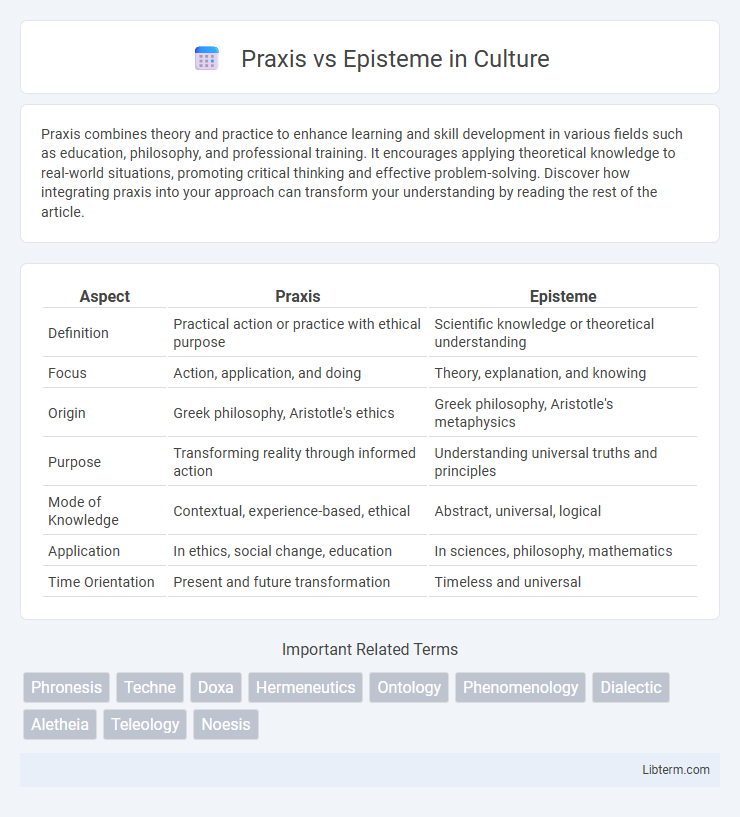Praxis combines theory and practice to enhance learning and skill development in various fields such as education, philosophy, and professional training. It encourages applying theoretical knowledge to real-world situations, promoting critical thinking and effective problem-solving. Discover how integrating praxis into your approach can transform your understanding by reading the rest of the article.
Table of Comparison
| Aspect | Praxis | Episteme |
|---|---|---|
| Definition | Practical action or practice with ethical purpose | Scientific knowledge or theoretical understanding |
| Focus | Action, application, and doing | Theory, explanation, and knowing |
| Origin | Greek philosophy, Aristotle's ethics | Greek philosophy, Aristotle's metaphysics |
| Purpose | Transforming reality through informed action | Understanding universal truths and principles |
| Mode of Knowledge | Contextual, experience-based, ethical | Abstract, universal, logical |
| Application | In ethics, social change, education | In sciences, philosophy, mathematics |
| Time Orientation | Present and future transformation | Timeless and universal |
Understanding Praxis: Definition and Key Concepts
Praxis refers to the process by which theory is enacted, practiced, or realized in practical action, emphasizing the integration of knowledge and practice. It involves reflexive action informed by ethical considerations and critical thinking, aiming to transform social realities through purposeful activity. Central concepts include intentionality, situational awareness, and the continuous feedback loop between action and reflection.
What is Episteme? A Philosophical Overview
Episteme in philosophy refers to a system of knowledge grounded in scientific, theoretical understanding, emphasizing universal truths and objective reasoning. It contrasts with praxis, which centers on practical action and experience-based knowledge. Originating from ancient Greek thought, episteme highlights structured, formal cognition crucial for epistemology and the philosophy of science.
Historical Roots: Praxis and Episteme in Ancient Philosophy
Praxis and episteme have distinct historical roots in ancient philosophy, with praxis referring to practical actions aimed at ethical living and societal well-being, primarily explored by Aristotle in his Nicomachean Ethics. Episteme, defined as scientific or theoretical knowledge, was emphasized by Plato and Aristotle as the pursuit of universal truths and intellectual understanding. The differentiation between praxis as morally oriented practice and episteme as objective knowledge shaped classical approaches to philosophy and education.
Praxis vs Episteme: Core Differences Explained
Praxis refers to the practical application of knowledge through action and experience, emphasizing the transformation of theory into real-world practice. Episteme represents theoretical, scientific knowledge that seeks to understand universal truths and principles through systematic study and reasoning. The core difference lies in praxis being action-oriented and context-dependent, while episteme is abstract, objective, and focused on acquiring foundational understanding.
The Role of Praxis in Contemporary Thought
Praxis in contemporary thought signifies the intersection of theory and action, emphasizing practical engagement over mere knowledge acquisition (episteme). It drives transformative social change by situating intellectual activity within real-world contexts, promoting active participation and ethical responsibility. This approach challenges traditional epistemological frameworks by asserting that knowledge is validated through lived experience and purposeful activity.
Episteme’s Impact on Scientific Knowledge
Episteme, embodying systematic and theoretical knowledge, forms the foundation of scientific inquiry by providing structured frameworks and methodologies essential for empirical research. Its emphasis on universal truths and reproducible results drives the advancement of scientific knowledge through hypothesis testing and validation. The epistemic rigor inherent in episteme ensures the reliability and objectivity of scientific discoveries, fostering continuous innovation and technological progress.
Interplay Between Praxis and Episteme in Education
The interplay between praxis and episteme in education fosters a dynamic learning environment where theoretical knowledge (episteme) informs practical application (praxis), ensuring students develop critical thinking and real-world problem-solving skills. Integrating episteme with praxis bridges abstract concepts and experiential learning, enhancing the retention and relevance of educational content. This synergy is essential in curriculum design, promoting active engagement and deeper understanding through reflective practice and evidence-based knowledge.
Real-World Applications of Praxis and Episteme
Praxis involves practical, action-oriented knowledge applied directly to real-world problems, such as in professional fields like medicine, engineering, and education, where hands-on experience shapes decision-making and skill development. Episteme refers to theoretical knowledge or scientific understanding that underpins these practices, often represented by formal theories, principles, and methodologies in disciplines like philosophy, mathematics, and natural sciences. The synergy between praxis and episteme enables effective innovation and problem-solving by combining experiential insights with rigorous, validated knowledge systems.
Critiques and Debates: Praxis versus Episteme
Critiques of praxis versus episteme debate highlight tensions between practical knowledge grounded in action and theoretical knowledge centered on universal truths. Some scholars argue praxis enables transformative social change through experience and reflection, while episteme risks abstraction detached from lived realities. Debates emphasize balancing applied wisdom with rigorous theory to address concrete problems without sacrificing conceptual depth.
Conclusion: Bridging Theory and Practice
Bridging the gap between praxis and episteme enhances practical decision-making by grounding actions in theoretical knowledge while allowing theory to evolve through real-world application. Integrating praxis and episteme fosters continuous learning, innovation, and effective problem-solving across disciplines. This synergy ultimately strengthens both understanding and action, creating a dynamic cycle of knowledge and practice.
Praxis Infographic

 libterm.com
libterm.com